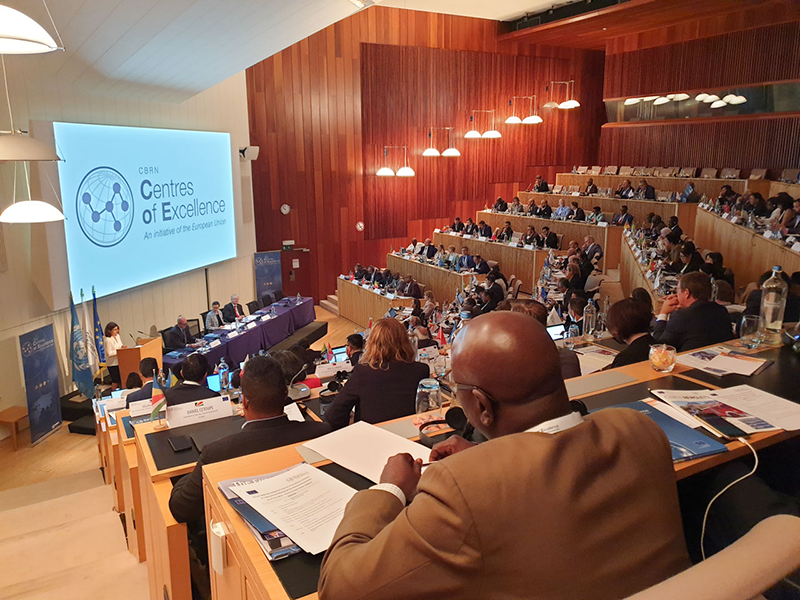
Today, the 7th International meeting of the CBRN Centres of Excellence (CoE) started in La Hulpe (Belgium) gathering 200 participants from more than 60 countries from Africa, Asia, the Middle-East, South-East and Eastern Europe involved in the European CBRN Centres of Excellence (CoE) initiative, as well as observers from Kazakhstan, the USA, and regional and international Organisations. This annual three-day meeting offers the occasion to discuss developments in each region, to evaluate new and evolving threats and to build a shared understanding on training strategies.
In her opening speech, Mrs Henriette GEIGER, Director, People and Peace, European Commission’s Directorate-General for International Cooperation and Development (DG DEVCO) underlined that the European Union is strengthening its security cooperation in and with many countries and regions worldwide.
Director Geiger said: “We are facing challenges today that go beyond national borders and cannot be tackled alone. This is true for cooperation on CBRN matters, as witnessed by recent CBRN attacks and events in Europe, its neighbouring countries and use of chemical weapons in Syria, but also by the re-emergence of epidemic diseases like Ebola in Africa, or by the increased devastating effects of natural disasters and climate disorders.”
Analysing the success of the EU led cooperation within the CBRN CoE Initiative, Mrs Geiger highlighted that after six years of efforts, the CBRN CoE community has reached a turning point and that a new, more risk-based approach will intensify and broaden CBRN operational activities on the ground. “Recent technological capabilities, like artificial intelligence, use of drones, cyber applications, highlight the need to look at all challenges, threats and risks in the future.”, she said.
Director Geiger reported on the impressive work undertaken since the last meeting in 2018, enumerating examples of successful cross-border cooperation and training exercises at global and regional level. “This meeting gives us the chance to share ideas and define next steps, in a creative and visionary way”, she concluded.
Mrs Bettina TUCCI BARTSIOTAS, Director, United Nations Interregional Crime and Justice Research Institute (UNICRI) told the audience that the CoE Initiative, with 62 countries working together, “is a telling example of a collective action for the common good.” She added that the mitigation of CBRN threats is a national, but also a regional and a global priority. Director Tucci Bartsiotas highlighted the long lasting tradition of collaboration between the United Nations and the European Union: “The European Union is an indispensable partner of the United Nations, contributing to regional and global peace and security, as well as to sustainable development and human rights.”
After today’s plenary sessions to review progress in each region and define future priorities, participants will hold thematic, regional and bilateral sessions tomorrow. On 14th June, the EU CBRN CoE 2019 Prize Awards for best regional CBRN projects will take place.
Venue:
Hotel Dolce
135, Chaussée de Bruxelles
B-1310 La Hulpe
Background information:
The EU CBRN Centres of Excellence Initiative was set up in 2011 to increase national and regional CBRN actions plans, foster local expertise and ensure long-term sustainability through a dynamic network. This initiative goes in line with the European Commission’s policy objectives in international cooperation and development, following the principle that security and development go hand in hand.
The European Commission's Directorate General for International Cooperation and Development (DG DEVCO) is responsible for designing European international cooperation and development policy and delivering aid throughout the world in order to reduce poverty, to ensure sustainable economic, social and environmental development and to promote democracy, the rule of law, good governance and the respect of human rights.
Details
- Publication date
- 12 June 2019
- Author
- Joint Research Centre
- Location
- Brussels
